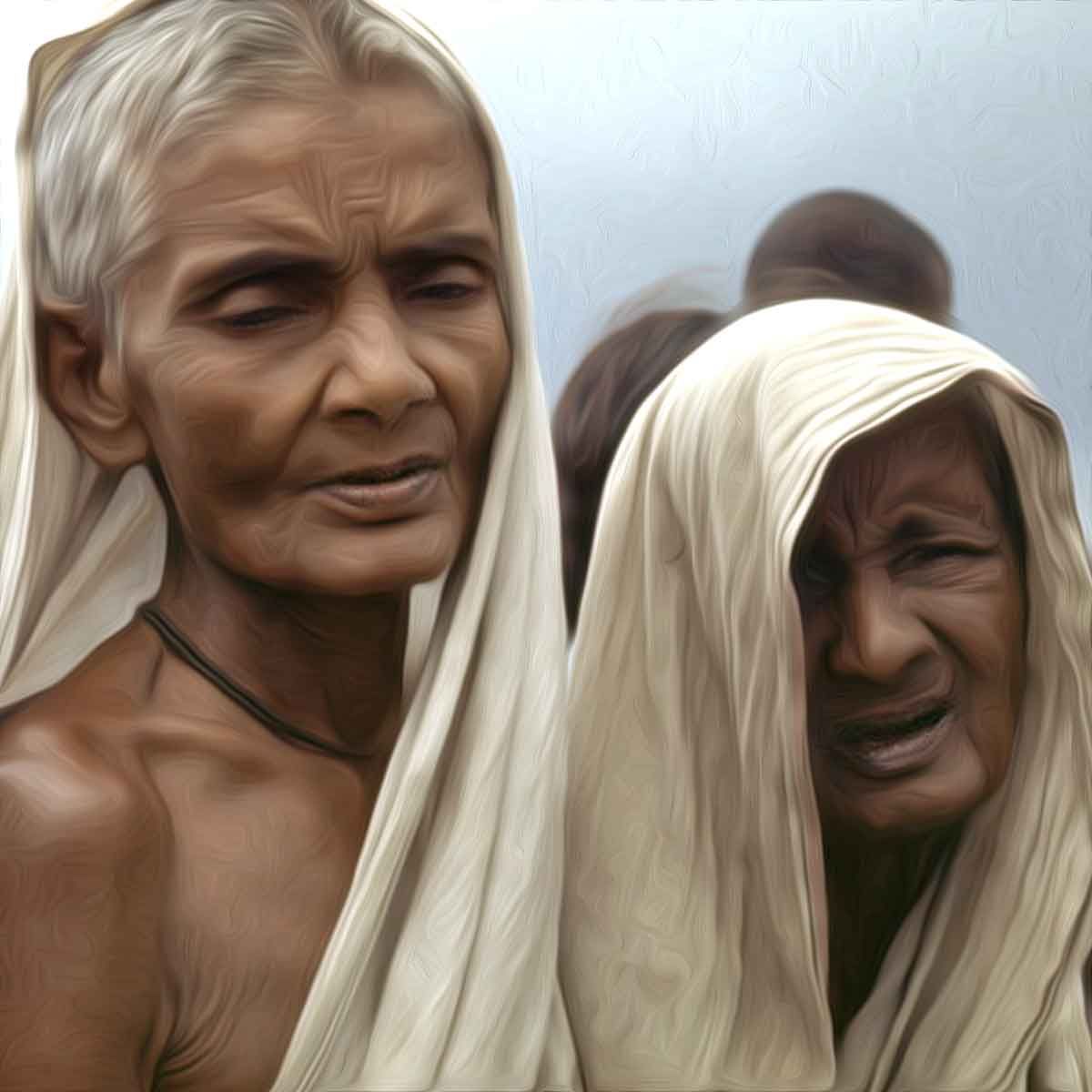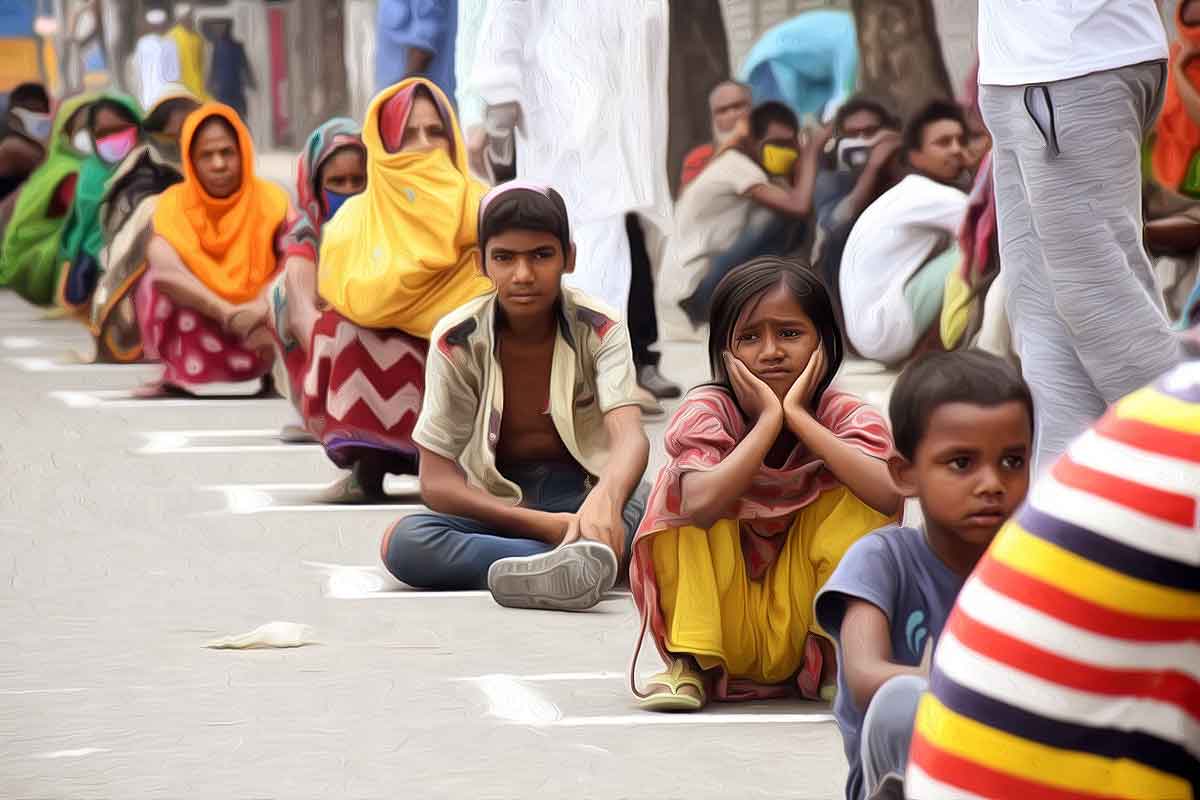Despite immense sacrifice by Hindu community in the liberation war they are subjugated denominations in the country. Bangladesh seized 26 lakh acres of land from Hindus under black law of “Enemy Property Act”

Despite the immense sacrifice made by the Hindu community in the liberation war, it could not reap any benefits of Bangladesh’s independence; even after 51 years of liberation, the Hindus continue to be one of the most subjugated denominations in the country.
Soon after gaining independence with the help of Bharatiya forces, the Bangladesh government enforced the Enemy Property Act and seized 26 lakh acres of property belonging to the Hindus in the country.
The financial loss due to the loss of land, ponds, and other movable property amounted to 20 lakh crore Takas.
Though the Islamic Republic claimed that it wanted to move away from Pakistan’s hate policies at the time of liberation, over the past 51 years, Bangladesh adopted the basic principles of Pakistan in their entirety.
In these years of independence, the law of the land has become a hindrance to Hindus and people of other minority communities.
They have been forcibly evicted from their ancestral property. If one brother of a Hindu family left the country due to the torments of Pakistani forces and settled in Bharat, his other siblings who continued to stay in Bangladesh were forced to pay the atonement.
Because in their books, if any Hindu who had a share in that combined owned property, then the whole property becomes “enemy property” that the government could usurp leaving the other Hindu family members robbed of their own property.
The simple idea on which the Bangladeshi authorities worked was that if a Hindu stays in the land of Muslims, he will be tormented until he leaves. After he fails to put up with these adversaries and leaves the country, his family members will be institutionally looted by the government. This process would continue till the last Hindu in Bangladesh didn’t leave that country.
 Bangladeshi authorities worked so that if a Hindu stays in the land of Muslims, he will be tormented until he leaves |
The Ramna Kali Temple was bulldozed on May 13, 1983, just months after the Father of the Nation Bangabandhu Sheikh Mujibur Rahman was elected as the first Prime Minister of Bangladesh.
The status of the Enemy Property Law continued to be just as pathetic for the minorities during the second and third parliamentary elections too, despite a power shift.
The governments continued to deprive the religious minorities of fair and impartial access to property rights and civil liberties and never returned the properties it had grabbed from the Hindus.
After the fifth parliamentary elections held on February 28, 1991, the Hindus became the target of post-poll violence following the BNP-Jamaat victory. There were attacks, vandalism, looting and occupation, and rapes in different parts of the country, including but not limited to Raozan, Fatikchhari, Jessore, Comilla, Khulna, Noakhali, Chandpur, Hatia, and Dhaka.
But none of these cases reached the courts, and neither were any criminals punished. On the other hand, hundreds of Hindu youths were held in jail despite being found innocent in a false case of blasphemy. Land grabbing and vandalism of Hindu temples and murtis became the norm and daily occurrence. From April 5, 1991, to November 24, 1995, 163 Acts were passed in the Parliament’s 22 sessions. The Black Law concerning the “enemy property” was still not revised.
The seventh parliamentary elections were held on June 12, 1996; the Bangladesh Awami League, led by Sheikh Hasina won 146 out of 300 seats. Again, 191 laws were passed in 233 parliamentary sessions between 1996 to 2001. None was to relieve the minorities from their ongoing harassment.
In 2001, the Bangladesh Nationalist Party led by Begum Khaleda Zia came to power with 193 out of 300 seats in the Parliament. 165 laws were passed in her regime, but property rights, civil liberties, and forced emigration of the minorities were again brushed aside.
This barbaric practice of overlooking the plight of religious minorities continued through the ninth, tenth, and the ongoing 11th government.
 Ramna Kali Temple was bulldozed after the Father of the Nation Bangabandhu Sheikh Mujibur Rahman was elected as the first Prime Minister of Bangladesh |
Many news laws were introduced, and acts were enacted. Notable among these were the sixteenth and seventeenth amendments to the Constitution. But the revolting law of “enemy / vested property” hasn’t been repealed. Zia and Hasina ignored the Hindus like they were invisible to both these leaders, year after year. Though Hasina enjoys a reputation of being minority-appeasing, her government has also not passed any law to protect minorities.
According to ‘Political Economy of Agriculture-Land-Waters Reform in Bangladesh’, a study by Dhaka University Professor Abul Barkat, 26 lakh acres of land that initially belonged to the Hindu community have been captured under the Enemy Property Act. A significant chunk of this land is agricultural land, 29 percent homestead, 4 percent is used for botany, 3 percent uncultivated, and 1 percent consists of ponds.
In his research, Dr. Barkat claims that around 230,612 Hindus go missing in the country or are forced to emigrate every year. In the final years of East Pakistan, when present-day Bangladesh was under Pakistan, around 705 Hindus went missing every day.
In 1981, for a decade after the liberation, this number stayed at 512 people missing every day. From 1981 to 1991, the number reduced to an average of 438. From 1991 to 2001, around 6 Hindus were compelled to leave the country daily. The number of missing Hindus daily stayed at an average of 64 from 2001 to 2012, with 632 Hindus migrating out of the country every day.
If this trend continues, Bangladesh will be left with no more Hindus in two to three decades. But isn’t that the entire plan?
References:
 Support Us
Support Us
Satyagraha was born from the heart of our land, with an undying aim to unveil the true essence of Bharat. It seeks to illuminate the hidden tales of our valiant freedom fighters and the rich chronicles that haven't yet sung their complete melody in the mainstream.
While platforms like NDTV and 'The Wire' effortlessly garner funds under the banner of safeguarding democracy, we at Satyagraha walk a different path. Our strength and resonance come from you. In this journey to weave a stronger Bharat, every little contribution amplifies our voice. Let's come together, contribute as you can, and champion the true spirit of our nation.
 |  |  |
| ICICI Bank of Satyaagrah | Razorpay Bank of Satyaagrah | PayPal Bank of Satyaagrah - For International Payments |
If all above doesn't work, then try the LINK below:
Please share the article on other platforms
DISCLAIMER: The author is solely responsible for the views expressed in this article. The author carries the responsibility for citing and/or licensing of images utilized within the text. The website also frequently uses non-commercial images for representational purposes only in line with the article. We are not responsible for the authenticity of such images. If some images have a copyright issue, we request the person/entity to contact us at This email address is being protected from spambots. You need JavaScript enabled to view it. and we will take the necessary actions to resolve the issue.
Related Articles
- Pro-Pakistani and a Pro-Khalistani Canadian MP Jagmeet Singh is busy whitewashing anti-Hindu attacks committed by Muslim mobs during Ram Navami procession: Urges Canada to intervene to restore Human Rights
- Hindu outfit Karni Sena files police complaint against Asaduddin Owaisi, Chandrashekhar Azad, SP candidate responsible for Kairana exodus and others: Anti-Hindu hate speech
- Result of collective myopia or paralysing hope is that we fail to see the patterns of Islamic aggression that have repeated themselves since time immemorial: Unfolding Khilafat 2.0 posters in 2019 to 2022 attacks on Ram Navami processions
- Fact-finding reported Jahangirpuri as a ‘ticking bomb’ of illegal immigrants, radicalisation, demographic stress, and illegal encroachments: Islamists resorted to stone-pelting, arson, and vandalism during Hindu procession
- Online Syndicate of radical Islamists that was targeting people for demanding justice for the slain Hindu Youth is exposed by Social Media user: Kishan Bharwad murder case
- Neeraj Prajapati, part of the pro-CAA tricolour march in Jharkhand was killed by a frenzied Muslim mob with an iron rod: Two years later his family still awaits justice
- 23 Jan to 29 Jan - 2022 - Hindus under attack: Bulletin roundup of persecution, discrimination, and hate crimes against Hindus
- Violence Against Minority Hindus in Bangladesh: The Mistier World Of Silence
- More videos of Maulana Usmani has surfaced showing how he openly called for violence and said, ‘CDS Bipin Rawat’s death was Allah’s work, Muslims should be prepared to kill or die’
- Angry Hindu worshippers caught a Muslim youth Yakub red-handed vandalizing idols placed in a Shiv temple in Muzaffarnagar: Yakub handed over to the police, demanded a fair and speedy trial, no violence reported
- Maulana Usmani says Muslims must continue to defend the honour of the Prophet without fear, terms it ‘peaceful mission’: Old videos show how Maulana was greeted with chants of ‘Sar Tan Se Juda’
- Sri Ram Shobha Yatra attacked with stone-pelting in Mulbagal town of Kolar district in Karnataka, Sri Ram idol pelted, Cars and motorcycles ransacked by the miscreants, motorcycle set ablaze: After Karauli, Hindus come under another attack
- Mohammedan needs to 'take back Babri Masjid', ISIS magazine states that Hindus are ‘filthy urine drinkers’ who learned civilized living from Muslims
- Prachi Rana, a 15-year-old girl killed in her house at Pratap Nagar in Amb for resisting molestation by Newspaper hawker Asif Mohammad: Accused arrested for silting throat, police urge people not to give it ‘communal’ colour
- In the latest development in Kishan Bharwad murder case, Ahmedabad police have arrested two suspects, Hindu organizations have called for a bandh protesting against the murder













